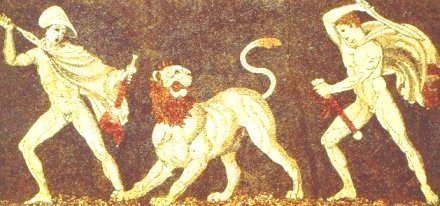Abstract: Aristotle replaced the supremacy, and rule, of freedom, openness, intelligence by the pursuit of happiness. So doing, Aristotle demolished the natural, instinctual, human ethics which had triumphed in Athens earlier. This fatally weakened the animal spirits without which democracy is impossible. Thus, more fundamentally than even Christianity, and not just by defending slavery extensively, Aristotle and his atrocious, mass murdering, yet beloved, students, launched the mental process that set civilization back by millennia.
It’s high time to understand how much of this Aristotelian garbage is at the root of today’s systems of thoughts and moods. All the more as plutocracy, Aristotle’s baby, is going all out, once again, to seize power absolutely.
Socrates, Plato, and Aristotle were master thinkers. Their influence was so great, they changed human psychology. And the way they changed it, in some important ways civilization cannot like.
[Painting Allegedly Representing Macedonian Plutocrats Antipater and Craterus Killing a Lion; these are the Antipater and Craterus found in the present text; top predators, indeed; shortly before Alexander The Great died, Alexander had ordered Antipater, then ruling Europe, to come to Babylon to answer the charges of Olympias, Alexander’s mom, that Antipater was conspiring to seize power; Antipater refused to come, and sent instead another of his sons in his stead; his youngest son was Alexander’s closest valet… Yes, at the time, there were lions in the Middle East, and in Europe.]
WHEN ATHENS BETRAYED DEMOCRACY, THAT IS, HERSELF:
In 330 CE, the Spartans, led by king Agis, made an all-out effort to destroy Macedonian hegemony. The prospects were good: Antipater had only 13,500 genuine Macedonian soldiers, as Alexander, then fighting the Persian plutocracy, had mobilized all the manpower he could find, to fight far away all over Eurasia. Alexander, though sent lots of gold, so that Antipater could pay for a huge army of northern barbarians to boost his force.
These were strange times: for about a century much of the elite of the Persian army consisted in Greek mercenaries. Moreover, most Greeks had refused to follow Alexander. No doubt that the fact Alexander had annihilated the city-state of Thebes, and sold 30,000 surviving women and children into slavery, had to do with it.
The Battle of Megalopolis against Antipater’s 40,000 mercenaries was bloody, long indecisive. But the 20,000 Spartans lost. 5,300 of the best ones died. Diodorus comments:
“Agis III had fought gloriously and fell with many frontal wounds. As he was being carried by his soldiers back to Sparta, he found himself surrounded by the enemy. Despairing of his own life, he ordered the rest to make their escape with all speed and to save themselves for the service of their country, but he himself armed and rising to his knees defended himself, killed some of the enemy and was himself slain by a javelin cast.”
So what was Athens doing while Sparta led the entire Peloponnese against Macedonia? Nothing. Athens sat on her hands. Some derangement had infected Athena’s city. Was it still Athena’s city? Or was it the city of admirers, friends, lovers, advisers and teachers to tyrants? In spite of a blitz by Demosthenes, the pseudo-Demosthenes, and other philosophers, who saw the terrible danger civilization was in, Athens did not send an army to help Sparta. There is no doubt that the smallest Athenian army would have allowed to extirpate the Macedonian metastatic cancer, all the way to where it festered from, Macedonian gold mines.
Once he was rid of Alexander, the senior Macedonian general and dictator Antipater, turned against Athens.
The fate of democracy was decided on the sea. The Athenian fleet, having suffered losses in two battles, surrendered. It did not even try to fight to death. The captains of the Athenian ships were not as determined as their ancestors, who, 170 years earlier, had confronted the Persian fleet and its Greek allies, under incomparably greater odds.
THE PHILOSOPHICAL TROIKA FROM HELL CHANGED ATHENS’ MIND ABOUT THE HIGHEST GOOD:
Historians are at a loss to explain that massive change of psychology. Why did Athens not fight for freedom in 330 CE, while it had gone all out for it in 500 CE?
Some may suggest that Alexander and Antipater were not as antipathic as Darius and Xerxes. Well that is not even true: the massacres the two Macedonians engaged in were worse. The Persian plutocracy found plenty of Greeks to help it, over a century, including all of Sparta for decades, and generations of top notch mercenaries. By contrast, very few Greeks accepted to work for the Greek speaking Macedonian tyrants, and Sparta always refused to do so.
So, when the Athenian captains decided to surrender to Antipater, without much fighting, it was not because they did not perceive him to be a monster. They knew he was a monster. It was widely suspected, for excellent reasons and strong circumstantial evidence, that Antipater had used one of his sons to empoison Alexander.
Something else had happened to change the psychology of the Athenian elite: accepting monstrosity had become acceptable. Thanks to whom? Aristotle’s student, Alexander (“the great”)? No, he was too busy crucifying thousands in Tyr for having dared to resist him. Nor was Alexander known for intellectual babbling (whereas Antipater was an author).
My explanation for this degeneracy in the minds of Athenian warriors, and statesmen, is that, thanks to the pernicious influence of the troika Socrates-Plato-Aristotle, Athenians changed their notion of superior wisdom.
ARISTOTLE’S EUDEMONIA, OR BEING GOOD TO ONESELF AS THE HIGHEST PRINCIPLE:
The freedom that had made their ancestors, and other Greeks stand on the pinnacle of civilization, had been displaced by an obsession with self-flourishing (“Eudaimonism”).
An ethical system where Eudaimonia, that is good (eu) spirits (daimon) is viewed as the highest good, is the door to materialism and the lowest passions.
Let’s have Conan the Barbarian (1982) lead the charge against Aristotle’s pursuit of happiness:
“Mongol General: Hao! Dai ye! We won again! This is good, but what is best in life?
Mongol: The open steppe, fleet horse, falcons at your wrist, and the wind in your hair.
Mongol General: Wrong! Conan! What is best in life?
Conan: Crush your enemies. See them driven before you. Hear the lamentations of their women.
Mongol General: That is good! That is good.”
[Thanks “Wtquinn” a commenter from Scientia Salon!]
The point: our ancestors have been top predators for a few million years. A top predator, at some point, will take pleasure in deploying top ferocity. Lionesses and wolves have been seen adopting orphan baby preys, out of goodness, and that clearly make them happy. But, still, their business is ferocity.
One needs to base one’s ethics on a more stable base than happiness.
PROPER ETHICS: SALAMIS. DYING FOR FREEDOM AS THE HIGHEST CALLING: :
An ethical system where dying for freedom is the highest calling is very different from one where one is pursuing the vague notion of “happiness”, and “self-flourishing”. Were the 300 with king Leonidas happy at Thermopylae? Yes! Why? They were happy to die for freedom. They were not just into their little self-flourishing at the Athenian captains
The happiness of Themistocles’ sailors at the Battle of Salamis while their city burned in the background came from fighting for causes bigger than themselves, freedom and justice. If they had been pursuing happiness, they would have fled, as Aristotle, faced with freedom and justice, did. Instead Themistocles’ men confronted a thousand ships.
Salamis was perhaps the most important battle in the history of civilization. That’s when freedom looked for a fight, and broke the back of plutocracy, in spite of overwhelming odds.
375 freedom ships confronted a plutocratic armada of 1200. But the Greeks had better equipment, better training, better spirits, their cause was just, freedom on their sides. Born free, they knew how to swim (most Persians did not). The narrow confines prevented the vast Persian fleet to maneuver, and surround them.
The entire population of Athens had been moved to the island of Salamis. Themistocles had around 200 Athenian warships. When his Peloponnesian allies threatened to fold, he threatened to move the entire population of Athens to the Western Mediterranean (this is how Marseilles, Massilia, had been founded from Phocea). Athens had a colony there, Athenopolis (unfortunately called Saint Tropez nowadays).
Or, at least, this is what the immensely clever Themistocles succeeded to make Xerxes believe.
In one of the best plots ever written, Themistocles, using this sort of subtle disinformation and outright lies, misled emperor Xerxes into battle, in spite of the objections of the much more clever Artemisia, evil queen of Halicarnassus, commanding the fiercest squadron of the plutocratic fleet.
It does not take much to influence a human mind. Themistocles knew this, and played with Xerxes’ as a cat with a mouse. Artemisia, an experienced warrior, clearly saw that the battle in the narrow confines between the island and the mainland was an unnecessary risk.
SOCRATES, PLATO AND ARISTOTLE WERE LOVERS OF PLUTOCRACY:
Those who advocate that Socrates, Plato and Aristotle could not have possibly sabotaged civilization understand little to the power of the mind.
Generally, it goes like this: when one points at their philosophical failures, such as the advocacy of dictatorship by Plato, their partisans smirk that the fact that the fact the philosopher spent years with the tyrant of Syracuse has nothing to do with it (see Massimo’s intervention in the preceding essay).
However, the failure of Socrates, Plato, and Aristotle were not personal accidents (such as Francois Villon murdering a priest). Socrates’ courageous battle exploits and death are shining examples. Plato, and Aristotle exhibited personal courage, close and personal, licking the toes, of some of the worst tyrants in history.
Socrates, Plato and Aristotle’s failure was systemic, not personal. And it’s all of the same kind. They replaced freedom, equality, and brotherhood with an obsession with taking care of the oligarchic self. Instead it is the greater primacy that they accorded to some values which devalued.
The Athenian fleet was defeated at the Battle of Amorgos (322 BCE) and failed in stopping reinforcements to reach Antipater.
The Athenian and allied democrats were finally defeated in 322 BCE at the Battle of Crannon in central Thessaly helped by another Macedonian gangster, Craterus. They beat back the weary Athenians in a long series of cavalry and hoplite engagements. Once again, their spirits failed the Athenians. While they were not routed, Athens and her allies, spurning Demosthenes strident, and cogent warnings, sued for peace on Antipater’s terms.
Antipater forced Athens to dissolve her government and establish a plutocratic system in its stead. Only those possessing 2,000 drachmas or more could remain citizens. The Demos was viewed, correctly, by the Macedonians, as the cause of the war.
But the Demos wanted to be free, and Aristotle wanted slaves.
23 CENTURIES OF PLUTOCRACY FOLLOWED, BUT THAT’S NOT US, ETHICALLY, & ETHOLOGICALLY:
The very failure of Socrates, Plato, Aristotle, made their success. The common denominator ethics that they promoted was favorable to tyrants, and that it is precisely why their work survived through the Dark Ages. Whereas those who defended freedom, equality and democracy were extinguished by the Christian censors and their plutocratic sponsors.
Am I advocating a return to some kind of paleo-state and, or, instinctual ethics?
Well, yes. Except it’s not a return, because we never left. We are what we are. Human ethology exists, and is a subset of primate ethology. We are 60 million years of evolution as primates.
What is the basic principle, the fundamental evolutionary force, of a primate? Higher, superior intelligence. How do we get it? Through independent minds then allowing their ideas to compete inside vast cultural system. Only openness, freedom and justice enable this independence. This was all pointed out in Pericles’ famous Funeral Oration. So it’s not like the plutocratic troika of Socrates, Plato, Aristotle, never heard of the notion.
Instead, what Pericles celebrated, the glory of the all-thinking Demos, was exactly the opposite of what Socrates, Plato, Aristotle and Antipater wanted.
Pericles was on the winning side, the side of Instinctual Ethics.
Monkey studies show that “instinctual ethics” is a fact. (Whatever “instinct” really mean: it could actually be logic masquerading as innate!) To talk about ethics without that fact front and central would be like talking about atoms, while discounting anything that may have been discovered after Lucretius.
Aristotle was the first biologist. He invented categories, now at the forefront of mathematics, where they increasingly replace old fashion algebra, by lifting up its essence into richer structures.
The ethical attacks of Socrates against (direct) democracy were always justified. What was not justified was the lack of temperance that made him throw the baby, democracy, with some of the problems it caused.
The intellectual troika from hell was all the more dangerous, that those were master thinkers. Aristotle was the first biologist. He invented categories, now at the forefront of mathematics, where they increasingly replace old fashion algebra, by lifting up its essence into richer structures.
The ethical attacks of Socrates against (direct) democracy were justified. What was not justified was the lack of temperance that made him throw the baby, democracy, with the bath, into the trash.
TOLERATING ARISTOTLE’S ETHICS IS TOLERATING PLUTOCRACY:
Their influence is still all too great, and solidly tied to minimizing the phenomenon of plutocracy, and how it influences people. A few hours ago, I met with an engineer, who reigns over a major international airport, a man of many languages and many countries. I fumed against Aristotle, but he told me: ”Yes, but we owe him everything!”
The exact opposite is true. Although the troika from hell made important contributions, it was much more important to have democracy survive and prosper.
Democracy is intelligence. If Athens had survived, and established a second, larger empire, displaced and replaced Rome, civilization could well have got millennia ahead. Although, of course, slavery would have had to be outlawed, be it only because it blocked technological progress (by discouraging and out-competing it).
So let’s sink the ethics of good spirits. Aristotle’s eudemonia. Instead let’s pursue the grim war of freedom against plutocracy, and the hellish superstitions which support it.
Some will smirk that plutocracy is not everything. But that’s like saying metastatic cancer is not everything. By killing the freedom of spirits, plutocracy kills what makes humans human and replaces it with the stupidity of primitive beasts.
History demonstrates this: Greek science, not just philosophy, tragedy (etc.) peaked immediately before Antipater, as Alexander’s executive regent, organized the fascist “Hellenistic” plutocratic dictatorships which ruled until the Roman Republic, a democracy, swept them away.
And peaked science did. In the last year of the Fourth Century BCE, Aristarchus proposed the heliocentric system, Euclid wrote the Elements, Archimedes invented Infinitesimal Calculus, and the Greek number system came very close to the one we use today.
Aristotle classifies democracy, the rule of We The People, as a deviant constitution. Being a crafty polemicist, he gives it a bone by saying in Politics III.11, that the multitude may be better than the virtuous few, sometimes. But that’s in an ocean of praise for aristocracy.
When he died in 322 BC, Aristotle named his student Antipater as executor-in-charge of his will. And what a will: destroy democracy, establish plutocracy. Enough said about Aristotle’s ethics.
Patrice Ayme






